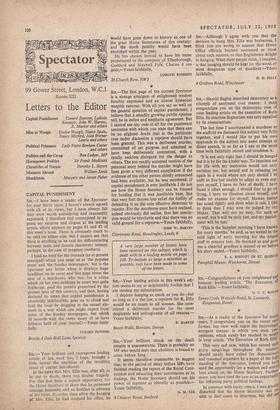SIR,—Harold Begbie described democracy as a triumph of sentiment over
reason : I must congratulate you on the democratic tone of your leading article on the execution of Ruth Ellis. Its absolute dogmatism was only equalled by its obscurantism.
The last time I accompanied a murderer to the scaffold we discussed this subject very fully together, and I would like to put his own approach to the subject into some attempt at direct speech, in so far as I can at the same time both faithfully record and condense it.
'It is not only right that I should be hanged but it is by far the kinder way. To imprison me for life with my memories would not only embitter mc, but would end in releasing me again in a world where not only should I be unfit to live but unable to adapt or even sup- port myself. I have no fear of death; I have faced it often enough. I should fear to go on living. I have no illusions about myself, and make no excuses for myself. Human justice has acted rightly and done what it cab; I like to think that I may now be judged by my Maker. That will not be easy, for such as myself, but it will be truly just, and my punish- ment will be just.'
'This is the happiest morning I have known for many months,' he said, as we waited in the cold light of early morning for the prison staff to prepare him. He thanked us and gave me a cheerful goodbye a second or so before his story ended,—Yours faithfully,


















































 Previous page
Previous page